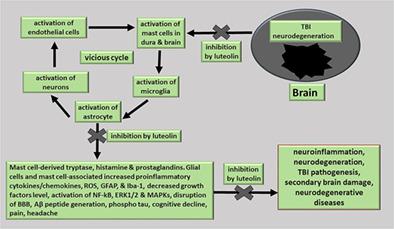当前位置:
X-MOL 学术
›
Biofactors
›
论文详情
Our official English website, www.x-mol.net, welcomes your
feedback! (Note: you will need to create a separate account there.)
Neuroprotective effects of flavone luteolin in neuroinflammation and neurotrauma
Biofactors ( IF 5.0 ) Pub Date : 2020-10-24 , DOI: 10.1002/biof.1687 Duraisamy Kempuraj 1, 2, 3 , Ramasamy Thangavel 1, 2, 3 , Deepak D. Kempuraj 1, 4 , Mohammad Ejaz Ahmed 1, 2, 3 , Govindhasamy Pushpavathi Selvakumar 1, 2, 3 , Sudhanshu P. Raikwar 1, 2, 3 , Smita A. Zaheer 1, 2 , Shankar S. Iyer 1, 2, 3 , Raghav Govindarajan 1 , Premkumar Nattanmai Chandrasekaran 1 , Asgar Zaheer 1, 2, 3
Biofactors ( IF 5.0 ) Pub Date : 2020-10-24 , DOI: 10.1002/biof.1687 Duraisamy Kempuraj 1, 2, 3 , Ramasamy Thangavel 1, 2, 3 , Deepak D. Kempuraj 1, 4 , Mohammad Ejaz Ahmed 1, 2, 3 , Govindhasamy Pushpavathi Selvakumar 1, 2, 3 , Sudhanshu P. Raikwar 1, 2, 3 , Smita A. Zaheer 1, 2 , Shankar S. Iyer 1, 2, 3 , Raghav Govindarajan 1 , Premkumar Nattanmai Chandrasekaran 1 , Asgar Zaheer 1, 2, 3
Affiliation

|
Neuroinflammation leads to neurodegeneration, cognitive defects, and neurodegenerative disorders. Neurotrauma/traumatic brain injury (TBI) can cause activation of glial cells, neurons, and neuroimmune cells in the brain to release neuroinflammatory mediators. Neurotrauma leads to immediate primary brain damage (direct damage), neuroinflammatory responses, neuroinflammation, and late secondary brain damage (indirect) through neuroinflammatory mechanism. Secondary brain damage leads to chronic inflammation and the onset and progression of neurodegenerative diseases. Currently, there are no effective and specific therapeutic options to treat these brain damages or neurodegenerative diseases. Flavone luteolin is an important natural polyphenol present in several plants that show anti‐inflammatory, antioxidant, anticancer, cytoprotective, and macrophage polarization effects. In this short review article, we have reviewed the neuroprotective effects of luteolin in neurotrauma and neurodegenerative disorders and pathways involved in this mechanism. We have collected data for this study from publications in the PubMed using the keywords luteolin and mast cells, neuroinflammation, neurodegenerative diseases, and TBI. Recent reports suggest that luteolin suppresses systemic and neuroinflammatory responses in Coronavirus disease 2019 (COVID‐19). Studies have shown that luteolin exhibits neuroprotective effects through various mechanisms, including suppressing immune cell activation, such as mast cells, and inflammatory mediators released from these cells. In addition, luteolin can suppress neuroinflammatory response, activation of microglia and astrocytes, oxidative stress, neuroinflammation, and the severity of neuroinflammatory diseases such as Alzheimer's disease, Parkinson's disease, multiple sclerosis, and TBI pathogenesis. In conclusion, luteolin can improve cognitive decline and enhance neuroprotection in neurodegenerative diseases, TBI, and stroke.
中文翻译:

黄酮木犀草素对神经炎症和神经创伤的神经保护作用
神经炎症会导致神经变性,认知缺陷和神经退行性疾病。神经外伤/创伤性脑损伤(TBI)可以引起脑中神经胶质细胞,神经元和神经免疫细胞的活化,从而释放神经炎症介质。神经外伤通过神经炎症机制导致立即的原发性脑损伤(直接损伤),神经炎症反应,神经炎症和晚期继发性脑损伤(间接)。继发性脑损伤导致慢性炎症以及神经退行性疾病的发作和发展。当前,没有有效且具体的治疗选择来治疗这些脑损伤或神经退行性疾病。黄酮木犀草素是几种植物中存在的重要天然多酚,具有抗炎,抗氧化,抗癌,细胞保护,和巨噬细胞极化效应。在这篇简短的评论文章中,我们综述了木犀草素在神经外伤和神经退行性疾病中的神经保护作用以及与该机制有关的途径。我们已经从PubMed的出版物中收集了本研究的数据,这些关键词使用了木犀草素和肥大细胞,神经炎症,神经退行性疾病和TBI。最近的报告表明,木犀草素可以抑制2019年冠状病毒疾病(COVID-19)的全身和神经炎症反应。研究表明木犀草素通过多种机制表现出神经保护作用,包括抑制免疫细胞活化(例如肥大细胞)和从这些细胞释放的炎性介质。此外,木犀草素还可以抑制神经炎症反应,小胶质细胞和星形胶质细胞的活化,氧化应激,神经炎症,以及神经炎性疾病的严重程度,例如阿尔茨海默氏病,帕金森氏病,多发性硬化症和TBI发病机理。总之,木犀草素可以改善神经退行性疾病,TBI和中风的认知能力下降并增强神经保护作用。
更新日期:2020-10-24
中文翻译:

黄酮木犀草素对神经炎症和神经创伤的神经保护作用
神经炎症会导致神经变性,认知缺陷和神经退行性疾病。神经外伤/创伤性脑损伤(TBI)可以引起脑中神经胶质细胞,神经元和神经免疫细胞的活化,从而释放神经炎症介质。神经外伤通过神经炎症机制导致立即的原发性脑损伤(直接损伤),神经炎症反应,神经炎症和晚期继发性脑损伤(间接)。继发性脑损伤导致慢性炎症以及神经退行性疾病的发作和发展。当前,没有有效且具体的治疗选择来治疗这些脑损伤或神经退行性疾病。黄酮木犀草素是几种植物中存在的重要天然多酚,具有抗炎,抗氧化,抗癌,细胞保护,和巨噬细胞极化效应。在这篇简短的评论文章中,我们综述了木犀草素在神经外伤和神经退行性疾病中的神经保护作用以及与该机制有关的途径。我们已经从PubMed的出版物中收集了本研究的数据,这些关键词使用了木犀草素和肥大细胞,神经炎症,神经退行性疾病和TBI。最近的报告表明,木犀草素可以抑制2019年冠状病毒疾病(COVID-19)的全身和神经炎症反应。研究表明木犀草素通过多种机制表现出神经保护作用,包括抑制免疫细胞活化(例如肥大细胞)和从这些细胞释放的炎性介质。此外,木犀草素还可以抑制神经炎症反应,小胶质细胞和星形胶质细胞的活化,氧化应激,神经炎症,以及神经炎性疾病的严重程度,例如阿尔茨海默氏病,帕金森氏病,多发性硬化症和TBI发病机理。总之,木犀草素可以改善神经退行性疾病,TBI和中风的认知能力下降并增强神经保护作用。











































 京公网安备 11010802027423号
京公网安备 11010802027423号